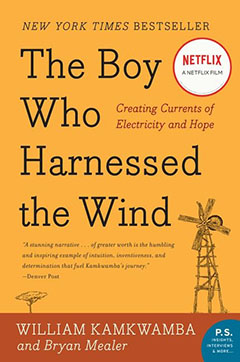February 14, 2020
K-State First selects 2020 common book; celebrates 10th anniversary with common reading program name change

Kansas State University and K-State First have selected the 2020 university common book: "The Boy Who Harnessed the Wind" by William Kamkwamba and Bryan Mealer.
Kamkwamba's best-selling memoir tells the true story of human inventiveness, following your dreams and improving your community.
"William Kamkwamba tells an amazing and engaging personal story of how he designed and built a windmill to generate electricity for a water pump to help his family and his Malawian village during a period of drought," said Greg Eiselein, professor of English and director of K-State First. "It's a narrative about engineering innovation in a time of need, but it's also a story about family, growing up and discovering what you love."
To celebrate its 10th anniversary in 2020, K-State First also is changing the name of the university common book program. The K-State Book Network will now be K-State First Book, or KSFB, and K-State First will roll out the name change during the course of the spring semester.
"The 2020 book selection allows us to continue conversations from the first 10 years of K-State First's common reading program as we explore themes of community, creativity, design, diversity and the environment," said Karin Westman, chair of the KSBN PR/events committee and department head of English. "Our 2020 selection also allows us to expand our conversations to an even wider audience, thanks to the young reader edition and picture book edition of the book and a broader range of programming partners."
"This book offers a global perspective on topics we are discussing at K-State and the region: wind energy, food insecurity, access to education, trade, and sustainability as well as many others," said Tara Coleman, chair of the K-State First Book committee and associate professor at K-State Libraries.
The members of the book selection committee — which includes 48 faculty, students, and staff from colleges and units across the university — chose the 2020 book after conversations and campuswide review.
"Campus feedback was very positive," Coleman said. "People shared that they liked the book's potential parallels between the Dust Bowl and that it offers a way to introduce the land-grand mission and global food system to first-year students."
K-State First Book will partner with several university and community organizations to coordinate programming for the 2020 common book. Programming partners so far include the College of Architecture, Planning & Design, the College of Engineering, the Global Food Studies Initiative, Kansas 4-H, the Staley School of Leadership Studies and USD 383.
"Our programming partners will plan a lecture, panel or other kind of event that draws on the expertise of that group to help the campus and Manhattan communities experience the 2020 selection in a new way," Westman said. "KSFB will provide publicity support for the event and our programming partners will receive three to five copies of the 2020 selection to share within their group in advance of the fall semester."
Interested departments or groups should contact ksbn@k-state.edu no later than March 15 to join the effort for the 2020 selection.
More information about the K-State First Book program, the 2020 book selection, and resources for its inclusion in fall activities and classrooms is available at the K-State First Book website, k-state.edu/ksbn.
